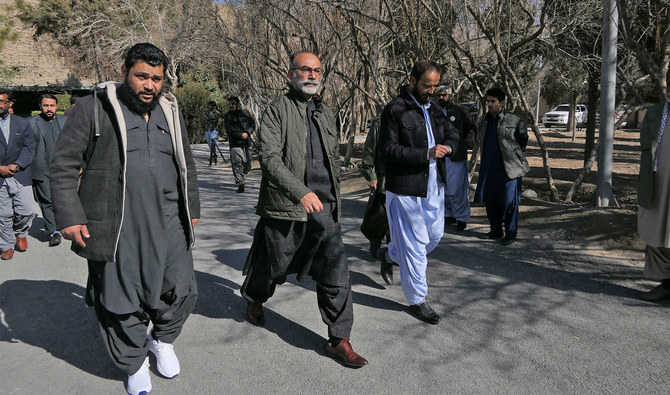QUETTA: For many like 38-year-old Muhammad Abid Hayat from the Pakistan National Assembly’s NA-263 constituency in the southwestern Balochistan province, the 2024 general elections come with little hope of change for voters who say political parties are following a decades-old pattern of promoting dynasties over grassroot politics.
Pakistan’s political landscape has long been dominated by well-established families, including the Sharif clan of three-time Prime Minister Nawaz Sharif, a wealthy industrialist family from Punjab, and the Bhutto dynasty of feudal aristocrats that has ruled the southern Sindh province for decades, given the country two prime ministers and whose scion, Bilawal Bhutto-Zardari, now has his sights set on the PM’s office.
Other than periods of military rule, the two rival families and the parties they founded have swapped the reins of power frequently throughout the 1990s and formed governments until only recently, when cricketer-turned-politician Imran Khan came to power through general elections in 2018 and ruled until 2022. But even 80 percent of Khan’s winning candidates in the 2018 elections in Punjab were dynasts despite the party rallying behind an anti-status quo banner, according to research by Dr. Hassan Javid, a former associate professor of sociology at LUMS who now teaches at the University of the Fraser Valley in Canada.
After Khan’s ouster from the PM’s office in a parliamentary no-trust vote in April 2022, Sharif’s younger brother Shehbaz Sharif became prime minister until late last year, when he handed over the reins of government to a caretaker administration constitutionally mandated to oversee next general elections, scheduled for Feb. 8.
In Balochistan too, the country’s largest but most underdeveloped province, it is families, or tribes, who have been at the helm for decades. Out of 16 National Assembly seats from Balochistan province, 442 candidates are eligible to contest the upcoming elections, with a majority coming from tribal and well-established political backgrounds.
“There are many political families and tribal leaders who have been contesting elections under family-based politics for years,” Abid, who works as a salesman at a local medical store, told Arab News on Quetta’s Patel Road, part of the NA-263 constituency where he will cast his vote.
“Dynastic politics discourages political workers who start their career from a grassroots political level from coming out to represent their people on the mainstream political ground … Dynasties in politics erode voters’ trust … Ahead of the general polls, it should end now.”
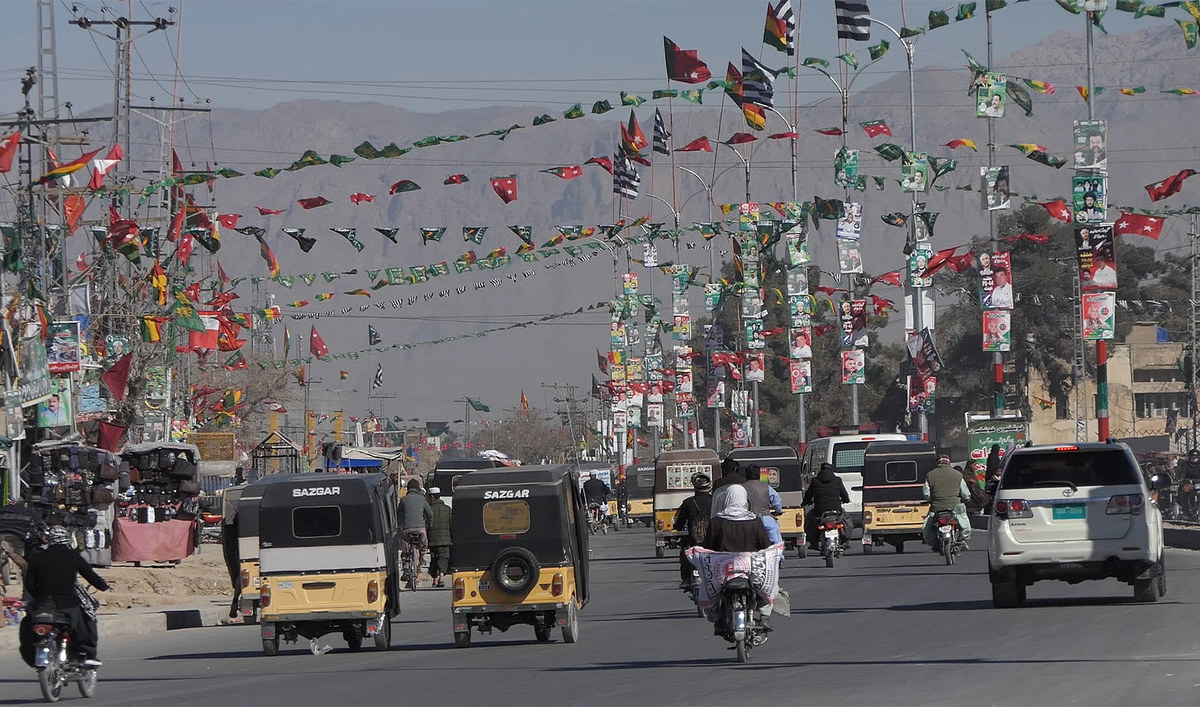
Pakistani commuters drive along a road with posters of candidates taking part in the upcoming general elections, in Quetta, Pakistan, on January 24, 2024. (AN photo)
Syed Ali Shah, a senior journalist and political analyst based in Quetta, the provincial capital, said despite strong roots in the province, candidates from known families would face “tough competition in 95 percent of provincial and national assemblies.”
Journalist Saleem Shahid, who has been covering general elections in Balochistan for the last five decades, agreed that independent candidates from non-political and middle class backgrounds would prove to be a challenge for powerful candidates in some constituencies of the provincial capital but “weaknesses” in the system served as an impediment to “common candidates” getting elected, including that political parties continued to back known faces armed with big money and vote banks.
“Political parties have to nominate common people as their candidates, and political procedures should be allowed to continue without interference so it will change people’s mindset to elect candidates with strong ideological backgrounds,” Shahid, who is the bureau chief for the daily Dawn newspaper in Quetta, said.
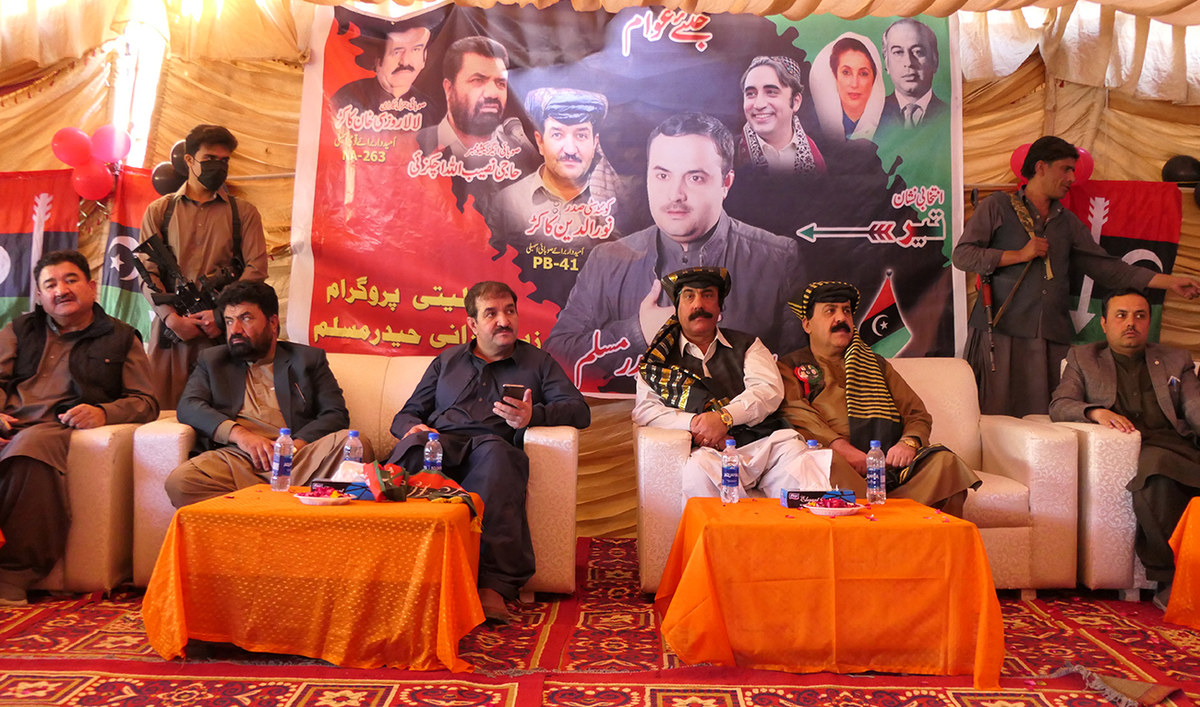
Candidates of the Pakistan People's Party campaign for the upcoming general election in Quetta on January 24, 2024. (AN Photo)
Still, a large number of independent candidates who hailed from middle-class and lower-middle class families were contesting against powerful political dynasties, tribal influencers and businessmen in the coming election, Shahid added.
Javed Ahmed Khan, 60, who is contesting from the provincial constituency PB-43 in Quetta district, said he was running in general elections for the first time “to counter political dynasties and wealthy candidates who can’t even understand the basic issues of common voters.”
“Why can’t the son of a poor man become a politician or member of the parliament?” the candidate said in an interview to Arab News. “They [wealthy candidates] vanish after being elected and close their doors on voters.”
“WHY DYNASTIES THRIVE”
But change will be a long and bumpy road in Balochistan, where the average inhabitant lives on not more than $2.5 daily, while more than 90 percent residents lack access to clean drinking water, and medical facilities and rural illiteracy surpasses 90 percent. Around 70 percent of the population lives in remote rural areas and relies on well-connected and well-heeled dynasts and tribal leaders to provide everything from jobs to facilities like schools, water and gas.
Thus, weakening dynastic politics would require the urbanization of the province and changes in the very structure of its political economy and governance model, experts say.
The military’s outsized role in the running of the province, which has for decades been plagued by a low-level insurgency by separatists militants and borders key rival nations like Afghanistan and Iran, also does not help, Quetta-based Shah added.
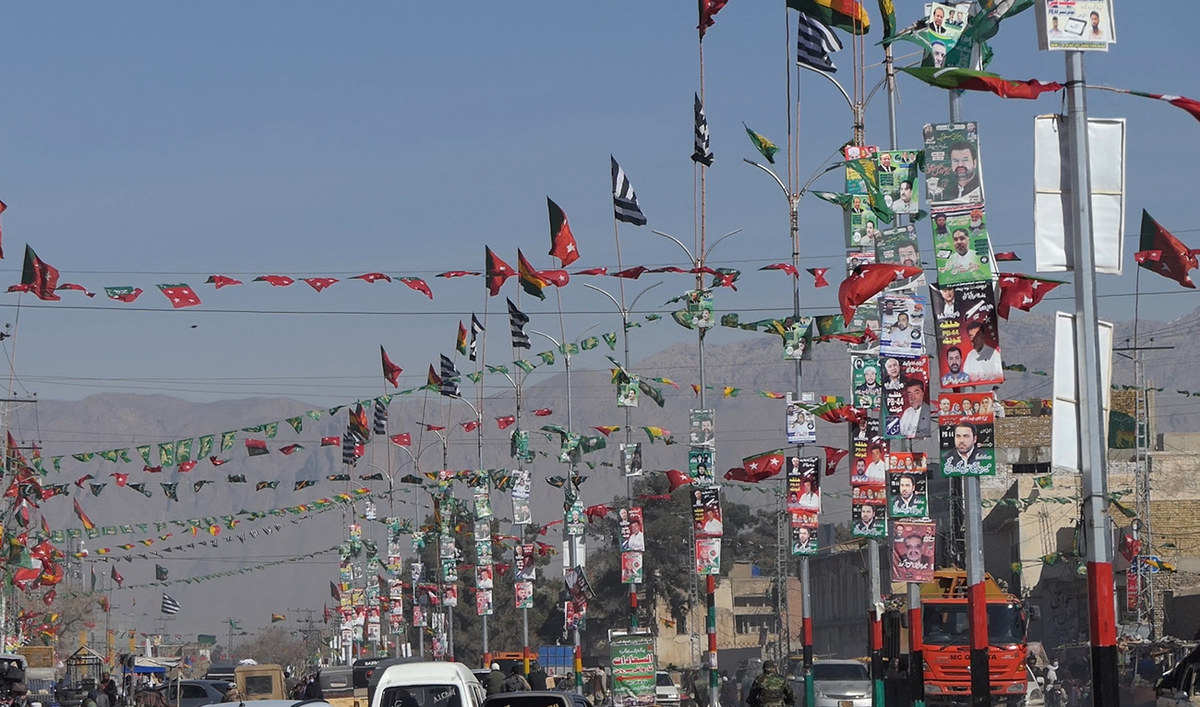
Election posters are installed along the street in Quetta on January 24, 2024. (AN Photo)
In Balochistan, there is a long and well-established history of the military pushing tribal elders and so-called electables, or candidates with large vote banks and political and economic clout, into preferred political parties or newly established ones ahead of each election, such as the Balochistan Awami Party, which was founded ahead of 2018 elections, thereby reinforcing the power of traditional families and well-entrenched tribal chieftains. The military denies it interferes in political affairs.
“Since Pakistan’s creation, the country has been ruled by military dictators, hence dynastic politics have thrived,” Shah added.
Dr. Hassan Javid, a sociologist at the University of the Fraser Valley in Canada, agreed thatthe major problem in Balochistan was that the powerful establishment had backed so-called electables for the last three decades.
“Establishment’s political interference should end to stem dynastic politics from Pakistani society,” the professor told Arab News. “Not only in Balochistan’s tribal society, the political dynasties ruling over the people in Sindh and Punjab provinces as well [are] based on community and ethnic-based politics.”
Take the Raisani tribe, whose Nawabzada Hajji Lashkari Raisani, a former senator, is an independent candidate from NA-263 Quetta city while his elder brother Nawab Aslam Raisani is contesting 2024 polls for a provincial seat, PB-35 Mastung, from the platform of Pakistan’s key religious party, the Jamiyet Ulma e Islam (JUI F), and his nephew Nawabzada Jamal Khan Raisani is a national assembly candidate on NA-264 for the Pakistan People’s Party (PPP).
Speaking to Arab News, Lashkari Raisani said political dynasties existed all over the world, from the Gandhi family in India to the Kennedy or Bush families in the United States.
“In the United States, the Kennedy and Bush families have been doing dynastic politics,” he said. “It is not an issue because in parliamentary politics, vote has a significant importance [no matter what family you are from].”
Another candidate, PPP’s former senator Rozi Khan Kakar, who is a national assembly candidate from NA-263 and whose younger brother Noor ud Din Kakaris is standing for the provincial seat PB-41, defended his brother’s nomination, saying the ticket was given on merit.
“My younger brother [Noor ud Din Kakar] is an active party worker who served as party’s district president for five years and established 200 new units in Quetta,” Kakar said. “Hence, he was nominated as the party’s election candidate on PB-41 by the central leadership based on performance, not on my personal will.”
Many voters believe the power to break the status quo lies in their hands, saying ordinary people in Balochistan needed to throw their weight behind pro-poor parties and make efforts to organize around a progressive economic agenda.
“In 2024 polls, I request the voters to support election candidates belonging to middle-class families,” said Alam Khan Kakar, a voter from Quetta’s PB-41 constituency, “in order to get rid of political families ruling from three generations for their personal gains rather than delivering for the public.”
“MATURITY WILL TAKE TIME”
Analysts said ‘free and fair’ elections in the province are the only solution to bring new faces into its politics.
“Balochistan” was famous for “political engineering” ahead of general polls, Professor Javid said, but “a change in political leadership from middle-class backgrounds” was possible in the next one or two elections, depending on whether a free political environment was allowed to candidates and voters.
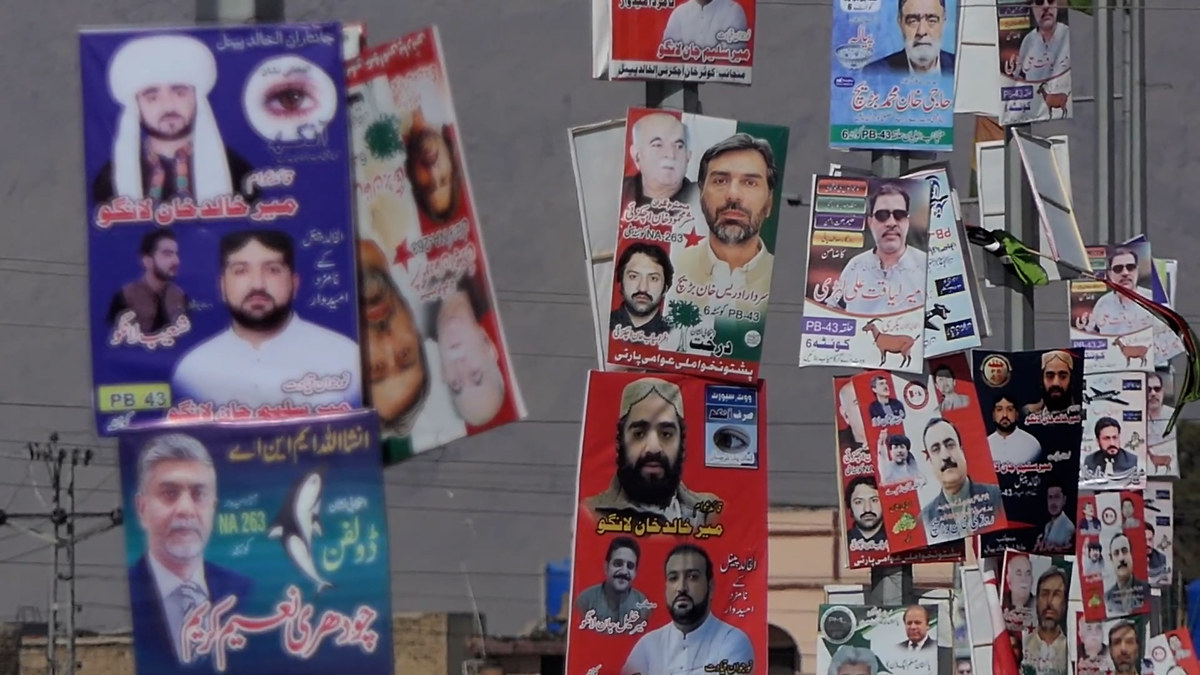
Election posters are installed along the street in Quetta on January 24, 2024. (AN Photo)
For 2024, the sociologist did not see much hope for new faces “because the political dynasties will change their party affiliations but the faces will remain the same.”
The cost of holding elections also keeps out new entrants in the impoverished region.
“Today the expenditures for contesting elections have reached millions of rupees, thus it is a daydream for a middle-class man in Balochistan,” Shah, the analyst, added.
“We are in a transition period but maturity will take time.”



